What is it like to raise children in Panama?
Mark Hurt
I have two daughters, four and eight years old, both of whom were born here in Panama. Both speak English and Spanish. Neither one of them know what its like in the US. There are some good points for that and a few bad points.
I think the good is they are not spoiled like I see most American kids, they don't get bored with simple things, they love being outdoors, and they have a chance to grow up in a country that is full of many things to learn and explore; more...
I think the good is they are not spoiled like I see most American kids, they don't get bored with simple things, they love being outdoors, and they have a chance to grow up in a country that is full of many things to learn and explore; more...
I have two daughters, four and eight years old, both of whom were born here in Panama. Both speak English and Spanish. Neither one of them know what its like in the US. There are some good points for that and a few bad points.
I think the good is they are not spoiled like I see most American kids, they don't get bored with simple things, they love being outdoors, and they have a chance to grow up in a country that is full of many things to learn and explore; more in nature than a concrete rat race I grew up in.
I find that the people here are not as violent as they are in the US. Every day growing up we had fights in school; two guys with fists only, then it turned into guns. Also drugs were huge in my high school; all types were there. Down here, in my 8 years I have yet to see a single fist fight from these kids, not even at the local park, and from what I have seen of the kids here there isn't a drug problem. If there were I would see kids doing drugs and the aftereffects of that, but here none. I'm not saying Panama is drug free, but all that coke is being shipped through here on it's way to the US. It's like smoking. Here you can't smoke indoors any place, and many places won't even allow you to smoke on their patio. They might have 4 brands of cigarrillos as they call them. I don't see the school kids smoking, either. So in these cut out a lot of things my girls would have to face in the US that they really don't have to here.
In our town, everyone knows everyone. If one of my girls are hurt or needs help or whatever, people around them will help them, while one would come to get me. It also works that way if they are doing something wrong. By the time they get home 3 people would have already told me about it. Most people here watch each other and help each other.
The school system here in Panama isn't the greatest at all. The public schools have very little as far as supplies and I do find that many of the teachers in these school are really not at a level education-wise to be teaching anything. The private school I find to be better but they are not cheap. Some in the city are very high end schools that charge you a ton of money. I feel that home schooling is the best route to take. For the price of a private school I could hire a young college person to teach my girls and they would be far ahead of everyone else when college time gets here. Now I'm talking about a college kid from the US, not here.
I have a lady that works for me who is in her third year of college who still can't do basic math. I find their college level is below our high school level.
I do feel that my girls are far better off here in Panama than in the US, and a lot healthier as well. Fresh fruits and vegetables, chicken, fish and beef, raised on farms here as opposed to growing pens and with chemicals. My girls have eaten at McDonald’s twice in their lives, whereas kids back in the US eat that junk food all the time.
We also live in a clean area. We don't have a huge town or city close by that is pouring trash into streams and ditches, and factories pumping out poison in our water and our air. That's a huge plus right there. These girls can wake up, walk outside in our yard and hand pick their breakfast, while wild parrots fly over head yelling good mourning.
There are more gang members in my hometown in the US than there are here in the whole country of Panama. The crime rate in my hometown in the US for a day is more then we see here in our town in years.
I find the people living here are all about family. They are close to everyone in their family and even though they don't have much they are always willing to share what they have.
The problems you are going to have with bringing your kids to Panama include that its world in Panama compared to what they are used to. Can they speak Spanish? That's a big step right there. How can you make friends when they can't speak the language? Also, your kids might not be used to the way of life here in that yours would have far more and better things than the kids here have. Most kids here in Panama just want a cell phone, so if your kids have a cell phone they’ll be on top. Now that phone might not have time on it to make a call but they have a cell phone. LOL. But that is the main thing with the young people here in Panama; not so much TV’s, radio and Xbox.
I think the good is they are not spoiled like I see most American kids, they don't get bored with simple things, they love being outdoors, and they have a chance to grow up in a country that is full of many things to learn and explore; more in nature than a concrete rat race I grew up in.
I find that the people here are not as violent as they are in the US. Every day growing up we had fights in school; two guys with fists only, then it turned into guns. Also drugs were huge in my high school; all types were there. Down here, in my 8 years I have yet to see a single fist fight from these kids, not even at the local park, and from what I have seen of the kids here there isn't a drug problem. If there were I would see kids doing drugs and the aftereffects of that, but here none. I'm not saying Panama is drug free, but all that coke is being shipped through here on it's way to the US. It's like smoking. Here you can't smoke indoors any place, and many places won't even allow you to smoke on their patio. They might have 4 brands of cigarrillos as they call them. I don't see the school kids smoking, either. So in these cut out a lot of things my girls would have to face in the US that they really don't have to here.
In our town, everyone knows everyone. If one of my girls are hurt or needs help or whatever, people around them will help them, while one would come to get me. It also works that way if they are doing something wrong. By the time they get home 3 people would have already told me about it. Most people here watch each other and help each other.
The school system here in Panama isn't the greatest at all. The public schools have very little as far as supplies and I do find that many of the teachers in these school are really not at a level education-wise to be teaching anything. The private school I find to be better but they are not cheap. Some in the city are very high end schools that charge you a ton of money. I feel that home schooling is the best route to take. For the price of a private school I could hire a young college person to teach my girls and they would be far ahead of everyone else when college time gets here. Now I'm talking about a college kid from the US, not here.
I have a lady that works for me who is in her third year of college who still can't do basic math. I find their college level is below our high school level.
I do feel that my girls are far better off here in Panama than in the US, and a lot healthier as well. Fresh fruits and vegetables, chicken, fish and beef, raised on farms here as opposed to growing pens and with chemicals. My girls have eaten at McDonald’s twice in their lives, whereas kids back in the US eat that junk food all the time.
We also live in a clean area. We don't have a huge town or city close by that is pouring trash into streams and ditches, and factories pumping out poison in our water and our air. That's a huge plus right there. These girls can wake up, walk outside in our yard and hand pick their breakfast, while wild parrots fly over head yelling good mourning.
There are more gang members in my hometown in the US than there are here in the whole country of Panama. The crime rate in my hometown in the US for a day is more then we see here in our town in years.
I find the people living here are all about family. They are close to everyone in their family and even though they don't have much they are always willing to share what they have.
The problems you are going to have with bringing your kids to Panama include that its world in Panama compared to what they are used to. Can they speak Spanish? That's a big step right there. How can you make friends when they can't speak the language? Also, your kids might not be used to the way of life here in that yours would have far more and better things than the kids here have. Most kids here in Panama just want a cell phone, so if your kids have a cell phone they’ll be on top. Now that phone might not have time on it to make a call but they have a cell phone. LOL. But that is the main thing with the young people here in Panama; not so much TV’s, radio and Xbox.
Posted August 10, 2014
Marla Diaz
For me, choosing to raise my family 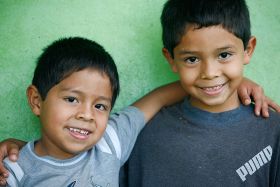 in Central America was the #1 reason I decided to move to Panama. I have known for a long time that I did not want to raise my children in the United States (my home country) because of declining family values and an increase in random violent crimes, among other things.
in Central America was the #1 reason I decided to move to Panama. I have known for a long time that I did not want to raise my children in the United States (my home country) because of declining family values and an increase in random violent crimes, among other things.
In my opinion raising my children in Coronado, Panama is very similar to what it was like when I was growing up in the rural south (near Charleston, SC) in the 70s and...
 in Central America was the #1 reason I decided to move to Panama. I have known for a long time that I did not want to raise my children in the United States (my home country) because of declining family values and an increase in random violent crimes, among other things.
in Central America was the #1 reason I decided to move to Panama. I have known for a long time that I did not want to raise my children in the United States (my home country) because of declining family values and an increase in random violent crimes, among other things.In my opinion raising my children in Coronado, Panama is very similar to what it was like when I was growing up in the rural south (near Charleston, SC) in the 70s and...
For me, choosing to raise my family  in Central America was the #1 reason I decided to move to Panama. I have known for a long time that I did not want to raise my children in the United States (my home country) because of declining family values and an increase in random violent crimes, among other things.
in Central America was the #1 reason I decided to move to Panama. I have known for a long time that I did not want to raise my children in the United States (my home country) because of declining family values and an increase in random violent crimes, among other things.
In my opinion raising my children in Coronado, Panama is very similar to what it was like when I was growing up in the rural south (near Charleston, SC) in the 70s and 80s. It is extremely safe here and as a result my children have much more freedom. It is kind of like when my parents told me to go outside and play and as long as I was back before dark they knew all was well.
 in Central America was the #1 reason I decided to move to Panama. I have known for a long time that I did not want to raise my children in the United States (my home country) because of declining family values and an increase in random violent crimes, among other things.
in Central America was the #1 reason I decided to move to Panama. I have known for a long time that I did not want to raise my children in the United States (my home country) because of declining family values and an increase in random violent crimes, among other things.In my opinion raising my children in Coronado, Panama is very similar to what it was like when I was growing up in the rural south (near Charleston, SC) in the 70s and 80s. It is extremely safe here and as a result my children have much more freedom. It is kind of like when my parents told me to go outside and play and as long as I was back before dark they knew all was well.
Also, the slower pace in which children grow up here in Panama is important to me. The kids simply are not exposed to things in Panama as early as they are in North American and European cultures. They maintain their naiveté longer and seem to grow up slower and this is appealing to me.
Sure, you can find this same atmosphere in other parts of the world but because Panama is so close to the East Coast of the US I am able to see my parents often.
Sure, you can find this same atmosphere in other parts of the world but because Panama is so close to the East Coast of the US I am able to see my parents often.
Posted August 13, 2014
Michael A. Martinez - B & B Real Estate Nicaragua / Panama Real Estate Information
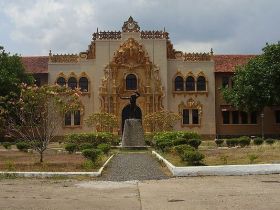 I have four young ones. There are a lot of events for the schools here in Panama. They really celebrate nationalism and there are a lot of games. They always get the kids involved in folklore and they know about the culture. All the communities march together; have processions during different holidays.
I have four young ones. There are a lot of events for the schools here in Panama. They really celebrate nationalism and there are a lot of games. They always get the kids involved in folklore and they know about the culture. All the communities march together; have processions during different holidays. Baseball is big here in Panama, and so is soccer. There is all kinds of leagues. There are a lot of programs for the kids to participate in....
 I have four young ones. There are a lot of events for the schools here in Panama. They really celebrate nationalism and there are a lot of games. They always get the kids involved in folklore and they know about the culture. All the communities march together; have processions during different holidays.
I have four young ones. There are a lot of events for the schools here in Panama. They really celebrate nationalism and there are a lot of games. They always get the kids involved in folklore and they know about the culture. All the communities march together; have processions during different holidays. Baseball is big here in Panama, and so is soccer. There is all kinds of leagues. There are a lot of programs for the kids to participate in.
As a father, I am always paranoid about leaving my child anywhere, but it is pretty safe here. I have not heard of any child abductions or anything like that here in Panama. Here, the community, all your friends and neighbors watch each other’s backs in raising the kids together. Especially, here in Western Azuero, I haven’t seen any kids associated with gangs or introduced to thefts. We are all joined in one big community, even though we live in six different communities. The only competition they have is in soccer games and little league baseball games and when the community puts up the best processions when they celebrate a holiday.
Posted February 24, 2015
Lourdes Townshend
Panamá, An Excellent Place to Raise Children
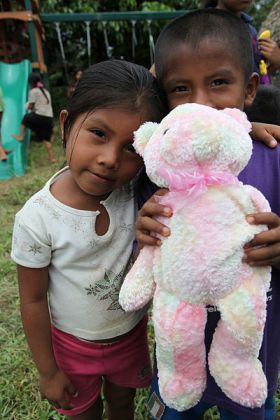 Panamá has excellent private schools and universities. Some of them were designed to the best of the best in places like in the United States or other First World study centers.
Panamá has excellent private schools and universities. Some of them were designed to the best of the best in places like in the United States or other First World study centers. Since the 19th century, whoever graduated from these recognized institution, especially those from Catholic schools, like Colegio Internacional de María Inmaculada, Corazón...
Panamá, An Excellent Place to Raise Children
 Panamá has excellent private schools and universities. Some of them were designed to the best of the best in places like in the United States or other First World study centers.
Panamá has excellent private schools and universities. Some of them were designed to the best of the best in places like in the United States or other First World study centers. Since the 19th century, whoever graduated from these recognized institution, especially those from Catholic schools, like Colegio Internacional de María Inmaculada, Corazón de Jesús, Nuestra Señora de Bethlem, La Salle, San Agustín or El Javier were assured of receiving the best education. I know this from experience, because I graduated from one of these esteemed Catholic schools in 1965, when a high school student could not graduate unless they spoke at least three languages.
Every single subject was covered in our study plans, from worldwide studies to the most complicated problems in calculus. When I graduated from high school, I was well prepared to be at the same level as a third year college student in Florida. I had such deep knowledge, I was able to comprehend and discuss many subjects, as well as be placed in advanced math. In comparison, the students in the United States seemed academically very well behind me.
In contrast to the private schools in Panamá, our public schools have a long way to go, but they are doing their best to upgrade to the curriculum they need. To train teachers for this task, the state university candidates in education have to earn a high GPA (grade point average) in order to graduate with a degree. This step has been taken to meet the goals of improving our public school education system.
But one thing is the common denominator of why our public schools are lacking: the paltry budgets set by Ministry of Education. Salaries are very low, especially when compared to private schools that offer teachers who have graduated from elite, private schools and with masters and post international educational degrees.
Another aspect of the education in Panamá is through the years, more and more non-religious private schools are offering their services in Panamá, some of them, exclusively for expats, foreigners or the children of executives from multinational corporations or diplomats. These schools usually teach a variety of the most used languages in the world.
Now to the subject of a family raising children in Panamá. Each one can make their choice. If you chose the "interior" (or countryside), life is more relaxed, and things are a lot easier. Communities are smaller, lives there are peaceful, and you are usually surrounded by chickens or other pets, children playing everywhere and having fun. Outdoor adventures are very popular and kids learn to share with friends. But, at the same time, in each city of the "interior," you can find resorts, hotels, restaurants and all kinds of fun places to go. Rivers, mountains, horse back-riding, fishing, scuba diving, snorkeling, jet skiing, surfing, riding four wheelers, and everybody at the beaches; all this makes the children go on and on, instead of staying 14 hours in front of the TV playing video games.
The opportunities to get into trouble are not that much. Parents, grandparents, uncles, aunts and cousins are always around to take care of the children or to bring them some kind of fun. With so many modern malls, movies and facilities, there is no need to be in a gang. Latin children are less likely to get in trouble. You never hear of a school shooting or other terrible thing you see on the international TV news.
Grandparents are a very special gift for Latin American children. They are always around. As Panamá is so small, even if they lived in a different town, it is just matter of a few hours of travel, and then the whole family can get together.
When you live in the city, there is no need to mention the fun the children can have. Moreover, usually Panamanians have a weekend house, either in the beach or mountains. And every weekend or holiday is a good excuse to get a get together and spend days doing what the children like to do best: have fun.
And if you have family overseas, technology and airlines are modern, so you can easily be in contact, either physically or via the Internet. No problem at all.
Posted February 24, 2015
Eddie Montes - Panama Property Rentals
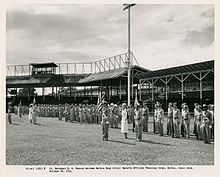 Panama is very child-friendly. There are really good schools.
Panama is very child-friendly. There are really good schools.The Panamanian school year differs from the typical American school year, which runs from August through June with the summer. If you are moving with your children to Panama from the US, they are obviously on an American school year, so you can have that continuity while bringing them here and then enroll them in an American school. Most American schools are located in a certain area, which used to be the...
 Panama is very child-friendly. There are really good schools.
Panama is very child-friendly. There are really good schools.The Panamanian school year differs from the typical American school year, which runs from August through June with the summer. If you are moving with your children to Panama from the US, they are obviously on an American school year, so you can have that continuity while bringing them here and then enroll them in an American school. Most American schools are located in a certain area, which used to be the military bases.
(Balboa High School ROTC ceremony in the form US Panama Canal Zone, Panama, pictured.)
Posted October 25, 2015
David Btesh - Pacific Realty / Pacific Developers
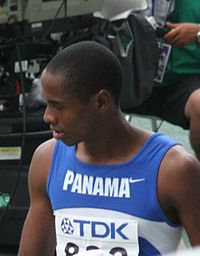 Raising children is easy in Panama.
Raising children is easy in Panama.The schools are excellent; both the private and the non-private. There’s a lot of help. The teachers are well-trained and some are brought from the United States to teach or from other countries. There’s a lot of extra-curricular activity and the kids are safe.
Our students here in Panama have a lot of opportunities if they want to get ahead. There’s music and art, and there’s sports. We have the best...
 Raising children is easy in Panama.
Raising children is easy in Panama.The schools are excellent; both the private and the non-private. There’s a lot of help. The teachers are well-trained and some are brought from the United States to teach or from other countries. There’s a lot of extra-curricular activity and the kids are safe.
Our students here in Panama have a lot of opportunities if they want to get ahead. There’s music and art, and there’s sports. We have the best boxers and the best basketball teams and we have Panamanians on baseball teams in the United States. We also have a lot of swimming and track teams.
We have a lot of opportunities in Panama and the children are open to everything in the world. The Internet in Panama is high-speed. You can get anything here almost immediately. All the movies, all the books, the entire Internet is available in Panama. In Panama, we are probably more up on the news than most people in the United States.
(Longjumper, Irving Jahir Saladino Aranda, Panama's first and only Olympic gold medalist, pictured.)
Posted October 30, 2015
David Bayliss - KW PACIFICA
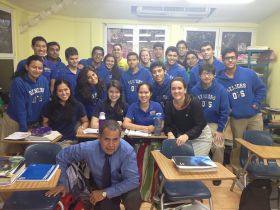 We moved here to Panama from Texas when my son was in 9th grade. What people do not realize is that many states (I think 24 of them) offer the state curriculum overseas. So when my son, Trent, was in school with live real teachers, they were teaching him to his Texas curriculum. This is probably one of the least-known things that makes Panama really an interesting opportunity. My son went four years to an international school with kids from all over the world. He graduated as a Texas...
We moved here to Panama from Texas when my son was in 9th grade. What people do not realize is that many states (I think 24 of them) offer the state curriculum overseas. So when my son, Trent, was in school with live real teachers, they were teaching him to his Texas curriculum. This is probably one of the least-known things that makes Panama really an interesting opportunity. My son went four years to an international school with kids from all over the world. He graduated as a Texas... We moved here to Panama from Texas when my son was in 9th grade. What people do not realize is that many states (I think 24 of them) offer the state curriculum overseas. So when my son, Trent, was in school with live real teachers, they were teaching him to his Texas curriculum. This is probably one of the least-known things that makes Panama really an interesting opportunity. My son went four years to an international school with kids from all over the world. He graduated as a Texas high school graduate even though he is in Panama with his ranking the same as it would have been in Texas. Trent was national honor society. He’s at the top 5% of his class and now he speaks Spanish as a bonus. He could go to college at Texas A & M University because he is university-qualified based on his SAT and his ranking, even though he didn’t choose to go there. That’s what can happen in states like Texas, Colorado, and Florida. On top of that, there is Florida State University right here in Panama that you could go straight into with in-state tuition no matter where you’re from. The whole educational stream is amazing. My son graduated. He is a great kid.
We moved here to Panama from Texas when my son was in 9th grade. What people do not realize is that many states (I think 24 of them) offer the state curriculum overseas. So when my son, Trent, was in school with live real teachers, they were teaching him to his Texas curriculum. This is probably one of the least-known things that makes Panama really an interesting opportunity. My son went four years to an international school with kids from all over the world. He graduated as a Texas high school graduate even though he is in Panama with his ranking the same as it would have been in Texas. Trent was national honor society. He’s at the top 5% of his class and now he speaks Spanish as a bonus. He could go to college at Texas A & M University because he is university-qualified based on his SAT and his ranking, even though he didn’t choose to go there. That’s what can happen in states like Texas, Colorado, and Florida. On top of that, there is Florida State University right here in Panama that you could go straight into with in-state tuition no matter where you’re from. The whole educational stream is amazing. My son graduated. He is a great kid. Five years ago, there was one international school out on the Pacific beach area (Coronado) but now there are three and they are all bursting at the seams and having to add onto their buildings every year. The number of people coming here from around the world with their kids is astounding. Panama City’s schools have been huge for years but to see the phenomenon like this on the beach is amazing.
In Panama City, there are several schools that are massive international schools. The academic standards of the schools here are all varying degrees of good. Like everywhere else, people always say that their kids are the smartest kids in the world and so every parent can think that the school isn’t teaching their little Johnny as much as they should but I’ve talked to hundreds of parents here and find that the academic standards of schools here in Panama are quite good.
(Students at Oxford International School, Panama City, Panama, pictured.)
Posted May 26, 2016
John Gilbert - PanamaKeys
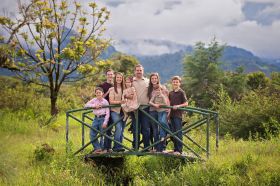 It’s a wonderful experience to raise our children here in Panama. I don’t ever feel, because I’m a homeschooling father, that the government is going to show up, knock at my door and put my children in foster care because we choose to homeschool our own children.
It’s a wonderful experience to raise our children here in Panama. I don’t ever feel, because I’m a homeschooling father, that the government is going to show up, knock at my door and put my children in foster care because we choose to homeschool our own children. That was an ongoing concern for us in Kentucky, but it doesn’t exist here in Panama at all. Here in Panama, I’m free to raise my children however I want to....
 It’s a wonderful experience to raise our children here in Panama. I don’t ever feel, because I’m a homeschooling father, that the government is going to show up, knock at my door and put my children in foster care because we choose to homeschool our own children.
It’s a wonderful experience to raise our children here in Panama. I don’t ever feel, because I’m a homeschooling father, that the government is going to show up, knock at my door and put my children in foster care because we choose to homeschool our own children. That was an ongoing concern for us in Kentucky, but it doesn’t exist here in Panama at all. Here in Panama, I’m free to raise my children however I want to. I’m in an area in Panama where we feel completely safe. My children enjoy a broad friend set of Panamanian, Hispanic, American, Costa Rican, Canadian, Spanish, and Mexican friends. Their eyes have been a lot more open to what the world is like and how small our world truly has become than if we had continued to raise them in Kentucky.
(The Gilbert family in Volcan, Panama, pictured.)
Posted May 29, 2017


